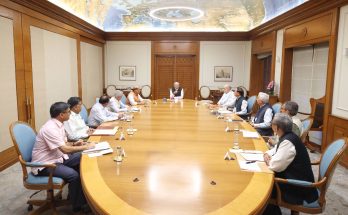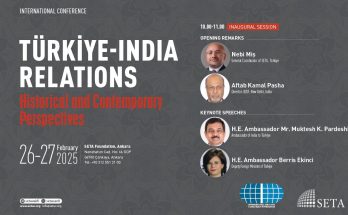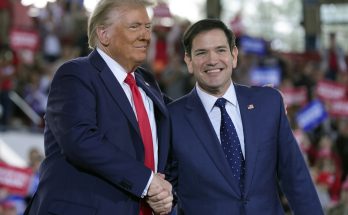 India’s Prime Minister Narendra Modi and his British counterpart Theresa May’s day together began in full swing, with participation in the India-UK CEOs forum and the India-UK Tech Summit, before engaging in one-on-one talks in the gardens of Hyderabad House and proceeding to delegation-level talks over a working lunch.
India’s Prime Minister Narendra Modi and his British counterpart Theresa May’s day together began in full swing, with participation in the India-UK CEOs forum and the India-UK Tech Summit, before engaging in one-on-one talks in the gardens of Hyderabad House and proceeding to delegation-level talks over a working lunch.
The outcomes of their wide-ranging discussions have been captured in a joint statement. A new fast-tracked visa regime has been announced for Indian businessmen, “reflecting the UK Government’s commitment to continuing to attract inward investment and business from India.”
India will become the first visa country to be offered the Registered Travellers Scheme, which will allow business travellers expedited clearance at the UK border by being allowed to come in through e-Passport gates usually reserved for Europeans and Britons and with no requirement to fill in a landing card.
A more exclusive, bespoke visa and immigration service, the Great Club, will also now be open to the Indian government to nominate Indian business executives. In fact, the Indian government will be the first government in the world to do so. These high net-worth individuals and their immediate family members will be provided with a personal manager to aid them in the process of applying for visas.
While of great interest to leading business icons and industrialists, as well as frequent business travellers to the UK who will benefit from the Registered Travellers Scheme, measures such as May’s pilot scheme to lower the price of specific tourist visas on her recent trip to China would have been also been appreciated here in India.
 Much to the disappointment of many in India, no measures were announced to revisit the stringent UK visa regime adversely affecting the access of Indian students and workers to UK universities and workplace. The two prime ministers “acknowledged the valuable contributions of the 1.5 million strong Indian diaspora to British society and their role in furthering bilateral relations,” as well as the fact that mobility strengthens people-to-people ties between the two counties, but tangible outcomes are limited.
Much to the disappointment of many in India, no measures were announced to revisit the stringent UK visa regime adversely affecting the access of Indian students and workers to UK universities and workplace. The two prime ministers “acknowledged the valuable contributions of the 1.5 million strong Indian diaspora to British society and their role in furthering bilateral relations,” as well as the fact that mobility strengthens people-to-people ties between the two counties, but tangible outcomes are limited.
Prime Minister May stated that there is no cap on overall numbers of international students, that Indian students remain welcome, and that the UK Home Secretary, Amber Rudd, “has recently announced her intention to consult on changes on the UK student visa regime.” For the time being, Indian students and workers will continue to face stricter rules as they look to move to the UK to pursue higher degrees or find work.
Mr Modi and Ms May today agreed to establish a Joint Working Group on Trade, which will “not only focus on ways to increase trade in goods, but also on the expansion of service trade, including through greater mobility of skilled professionals,” as per Mr Modi’s press statement. Indian frustration at the tighter immigration rules are bound to be brought up at this platform.
Author Profile
- India Writes Network (www.indiawrites.org) is an emerging think tank and a media-publishing company focused on international affairs & the India Story. Centre for Global India Insights is the research arm of India Writes Network. To subscribe to India and the World, write to editor@indiawrites.org. A venture of TGII Media Private Limited, a leading media, publishing and consultancy company, IWN has carved a niche for balanced and exhaustive reporting and analysis of international affairs. Eminent personalities, politicians, diplomats, authors, strategy gurus and news-makers have contributed to India Writes Network, as also “India and the World,” a magazine focused on global affairs.
Latest entries
 India and the WorldJune 26, 2025Operation Sindoor: India Sheds Restraint, Rediscovers Utility of Force
India and the WorldJune 26, 2025Operation Sindoor: India Sheds Restraint, Rediscovers Utility of Force India and the WorldJune 23, 2025BRICS summit in Rio to focus on Global South, local currency trade
India and the WorldJune 23, 2025BRICS summit in Rio to focus on Global South, local currency trade Africa InsightsJune 11, 2025New Opportunities in India-Japan Cooperation in Africa
Africa InsightsJune 11, 2025New Opportunities in India-Japan Cooperation in Africa India and the WorldMay 23, 2025Post-Operation Sindoor, India reminds Turkey, China of concerns and sensitivities
India and the WorldMay 23, 2025Post-Operation Sindoor, India reminds Turkey, China of concerns and sensitivities







